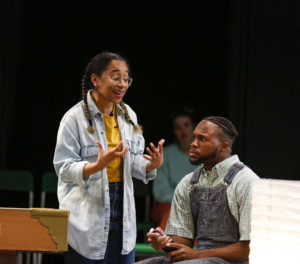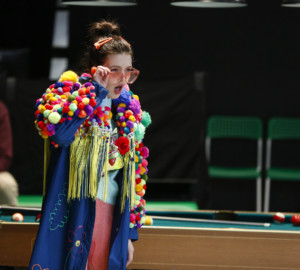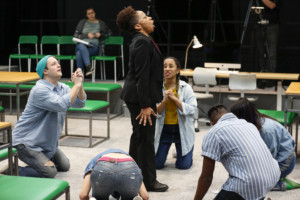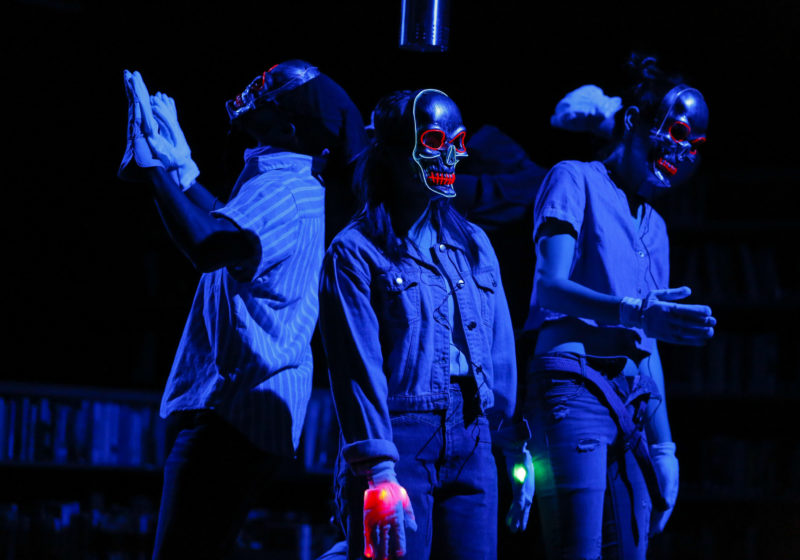When you think of a theater, you probably think of a stage on one end with rows of seats facing it. “Everybody,” Todd’s performance of Branden Jacobs-Jenkins’ pulitzer nominee, throws that convention out the window.
“Everybody” is a show about, well, everybody. And dying. One day God decides to ask Death for a report about why people live life the way that they do. So Death goes to everybody and tells them they’re going to die, and that they can take one person with them. The story follows “Everybody” as they try and find someone to die with them.
Sitting in this theater is an immersive experience, and if you arrive early enough, you might be able to snag a seat at one of the few tables in the center of the floor. It’s worth it.
I saw “Everybody” twice, because half the cast has to memorize virtually the entire script, as their roles are drawn by lottery each show. I can’t recommend that you see it twice because on my second time, it hadn’t changed enough to justify it.
 But I still recommend the show, provided you aren’t triggered by themes of untimely death or internal thoughts during panic attacks. As it happens, I am, so I found “Everybody” quite triggering. I still thoroughly enjoyed both performances, aided by the exceptional acting and comic relief provided throughout.
But I still recommend the show, provided you aren’t triggered by themes of untimely death or internal thoughts during panic attacks. As it happens, I am, so I found “Everybody” quite triggering. I still thoroughly enjoyed both performances, aided by the exceptional acting and comic relief provided throughout.
Speaking of comedy, I must highlight the performance of Junior Hernan Sanchez Garcia, who plays the Usher, God, and Understanding. He was a riot. Garcia — while everybody was great — was easily the best actor, emoting exceptionally and providing the best pre-show briefing I’ve received. If I had the opportunity to see a show where he was the only actor, I’d be first in line.
Now, I must comment on what I called “internal thoughts during panic attacks.” There are several pitch-black scenes where you hear the internal dialogue of the character Everybody. These were some of the most confusing scenes I’ve ever seen in theater, second only to another scene in “Everybody” with dancing skeletons.
That scene, in particular, had great music and choreography, but contributed absolutely nothing to my experience other than scaring the shit out of me the first time around. At least the internal dialogue contributed tangentially to the plot, though I wish there had been some resolution to what was really happening there.
But there were some other incredible points and actors. First year Miles Harrison (Evil) and guest-actor Joey Gregoire (Boy) had only a handful of lines but rocked their roles despite that. Gregoire, the cast’s youngest member, charmed even before his first line during an exchange with Kinship. Harrison embodied all of our evils during his entrance, walking in with modern vices – a Starbucks drink and Airpods. For someone whose role was supposed to be the embodiment of Evil, Harrison delivered. As did guest-actress Esther Winter, who played the perfect Death.
 Sophomore Isabel Hudson, who plays Love, was also noteworthy. Her role was a kinky, dominant character, and I was satisfied by how she embraced it. The scene where she dominates Everybody is should send a message to the audience, and I might have missed it if not for Hudson. She, along with many of the other actors, broke the fourth wall a handful of times, and as a reporter I should probably note that I am very partial fourth-wall-breaking.
Sophomore Isabel Hudson, who plays Love, was also noteworthy. Her role was a kinky, dominant character, and I was satisfied by how she embraced it. The scene where she dominates Everybody is should send a message to the audience, and I might have missed it if not for Hudson. She, along with many of the other actors, broke the fourth wall a handful of times, and as a reporter I should probably note that I am very partial fourth-wall-breaking.
It was clear that some of the other actors, however, were more suited for specific roles. For example, first-year Cynthia Xiao, who played Stuff one night and Friendship on the other, shone brightly as Stuff. As Friendship Xiao did well, but there just seemed to be something missing as compared to their first-night performance.
Similarly, Take 5 scholar Benjamin Frazer , who played Kinship one performance and Stuff the other, found their better performance in Kinship. As Kinship, they reminded me of some of my own uncles, whereas their taller frame didn’t fit the role of Stuff nearly as well as Xiao’s. I would say that the lottery pulls on the first night were better than the ones on the second in general.
 However, the role of Everybody, played first by Sophomore Oti Yonwuren and second by Campus Times Senior Staff and Junior Jayda Medina, was, I think, nailed by both actors. Medina’s performances first as Friendship then as Everybody were spot-on. I’m personally curious how Yonwuren would have done as Friendship if Medina was Everybody. But both were so talented that I believe they would have acted exceptionally in nearly any role.
However, the role of Everybody, played first by Sophomore Oti Yonwuren and second by Campus Times Senior Staff and Junior Jayda Medina, was, I think, nailed by both actors. Medina’s performances first as Friendship then as Everybody were spot-on. I’m personally curious how Yonwuren would have done as Friendship if Medina was Everybody. But both were so talented that I believe they would have acted exceptionally in nearly any role.
The other drawback of the role lottery is that eventually someone gets the same role. In my case, I saw Senior Daniela Shapiro play Cousin (and also Mind) during both shows. While I wish I had seen her in a different role the second night, Shapiro’s performance more than made up for it. Her performance as Mind was unreal. It took me a few minutes to realize that the astute-looking British-accented Mind was, minutes prior, the peppy teenage American-accented Cousin.
My only other gripe about the lottery is the questionable fit of some actors into certain roles made the delivery of some lines feel slightly mechanical, enough that I wished the cast had spent an extra day or two rehearsing before the show opened.
Still, despite its flaws, I enjoyed “Everybody.” Do consider seeing “Everybody,” because if there’s a unique show worth seeing, it’s this one.






